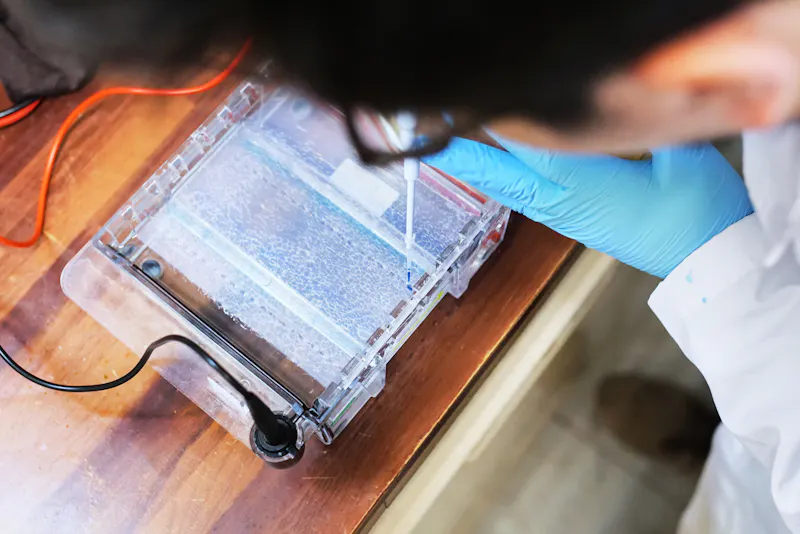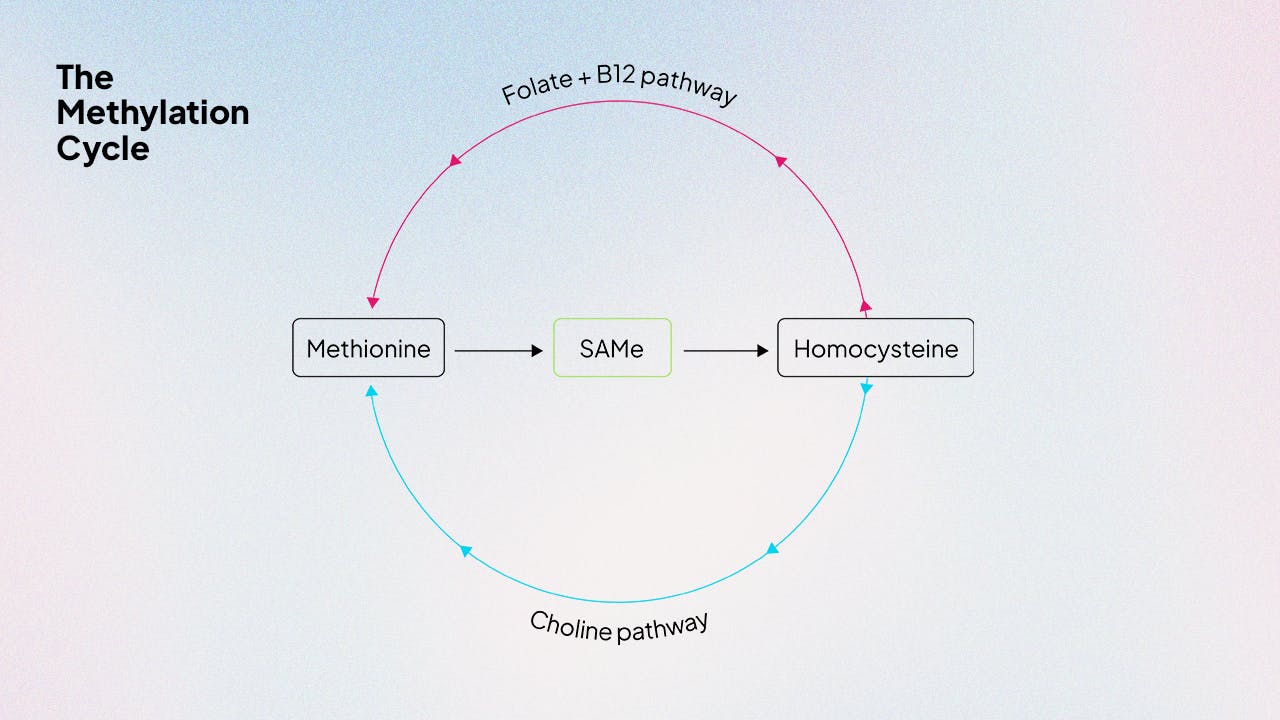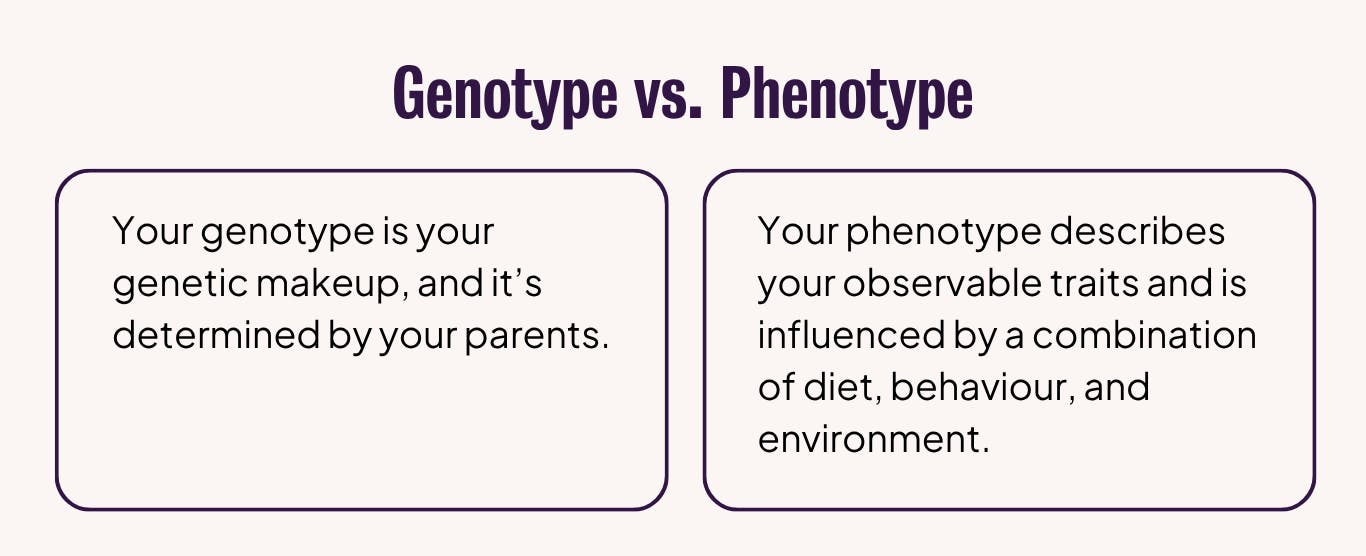Why we don't offer DNA methylation testing
What's covered?



The idea is undoubtedly exciting—a DNA test to unlock your genetic blueprint, providing clear instructions on what supplements to take and how to eat. But the reality is that DNA methylation tests have critical limitations, and they may not deliver what they promise.
As the research currently stands, DNA methylation doesn’t meet our high standards. Our team of trained doctors chooses the tests we offer through a rigorous process evaluating the latest research. We only offer a test if it provides accurate information that leads to actionable next steps.
Methylation is a complicated, tangly topic. We're going to break down in simple terms how methylation actually works, what testing can show you, and what it can’t.
What is DNA methylation, and why is it important?
Your DNA contains information about your genes, which determine individual characteristics like blood type, eye colour, and your risk of getting certain diseases. But some genes are dynamic—and DNA methylation is one way they can be turned on and off.
Methylation is a basic chemical reaction that happens billions of times every day. It involves donating a methyl group, a small molecular structure, to other molecules. This is essential for basic processes like regulating gene activity, producing brain chemicals, and handling cell detoxification and repair.
In order to run smoothly, methylation requires specific nutrients found in food: folate (vitamin B9), vitamin B12, choline, and methionine (from dietary protein). Your body converts methionine into S-adenosylmethionine (SAMe), which supplies the methyl groups needed for methylation. The entire process creates a byproduct called homocysteine which is recycled back into methionine.

Nutrients from two pathways (folate + B12, and choline) help produce methionine, which your body converts to SAMe. After donating its methyl groups, SAMe becomes homocysteine, which recycles back to methionine to repeat the cycle.
As the supplier of methyl groups, SAMe has an important role. Your body can produce it through two pathways: one using folate (B9) and B12, and one using choline. In most people, both contribute fairly equally. However, if one is lacking, the other can compensate by increasing production—which means a genetic variant affecting one pathway doesn’t typically cause problems.
How DNA methylation testing works (and why we don’t offer it)
Commercial methylation tests analyse your DNA for variants in genes involved in methylation pathways. These variants are typically inherited from your parents and present at birth.
One of the most commonly tested genes is methylenetetrahydrofolate reductase (MTHFR), an enzyme in the folate + B12 pathway discussed above. Having an MTHFR variant can mean your body doesn’t process folate as efficiently.
But this generally isn’t an issue, which underlies the critical problem with DNA methylation testing:
Having a genetic variant doesn't mean the methylation process isn't working in your body.
Why is this the case?
If one methylation pathway is compromised, another can compensate
Our bodies are incredibly complicated, but they’re also very good at self-correcting. Your body’s two pathways to produce SAMe—folate + B12 and choline—work in tandem. When one pathway is less efficient, the other boosts activity.
Genetic tests show potential, not reality
Your genotype can only tell you about theoretical risk, not current status. To understand whether your methylation is functioning properly right now, you need to test your phenotype, which means testing actual nutrient levels (e.g. vitamin B12 and folate) and functional markers (e.g. homocysteine).

Because of the compensation effect, research has shown that your genotype doesn’t predict health outcomes. A 2024 review paper showed that the impact of MTHFR on health risks was inconsistent, and noted that diet, lifestyle, ethnic background, and other genetic factors played an important role.
Similarly, a study on 6,000 U.S. adults found that one MTHFR gene variant wasn’t associated with higher mortality or cardiovascular disease mortality.
Essentially, the research shows us that when you look at large groups of people over time, genotype doesn’t predict who gets sick—and that means it’s not particularly useful.
What you do matters more than what you inherited
The power really is in your hands when it comes to improving health, but you don’t need a DNA test to tell you how to do it. While some claim that MTHFR variants explain symptoms like fatigue, brain fog, and low mood, this is a significant oversimplification.
These factors are polygenic (influenced by multiple genes) and heavily dependent upon sleep quality, stress, diet, environment, and lifestyle. Attributing them to a single gene doesn’t accurately depict the human body's complexity.
Alternative tests to DNA methylation
Testing your genes only tells you about theoretical risk, not current status. To understand whether your methylation is functioning properly, you need to test your phenotype (i.e. what’s actually happening in your body).
These markers give us tangible data you can use to make informed choices about your health:
- Homocysteine: As a byproduct of the methylation process, this can help you understand how the process is functioning. It can give you valuable information about your risk of heart disease and cognitive decline. This is Thriva’s most recently added test, and it will soon be available for our customers.
- Vitamin B12: As one of the nutrients fuelling methylation, your B12 status can tell you whether or not you may want to make dietary changes or try a supplement.
- Folate (B9): This micronutrient is also a driver of methylation. If you have low levels, you can increase your intake with food or supplements.
Take our quiz to build a blood test personalised to you.
Takeaway
We don't offer DNA testing because having a variant in genes involved in methylation doesn't mean you have a problem. The promise of a test to reveal your body’s ‘blueprint’ is exciting, but the science just isn’t there.
But the research does show that your day-to-day actions have a more marked impact on your health. While testing for nutrients and enzymes related to the methylation process can give you valuable information, feel confident that the ability to meaningfully impact your future health is in your hands.
- Cheng, B. et al. (2022). A large-scale polygenic risk score analysis identified candidate proteins associated with anxiety, depression and neuroticism. https://molecularbrain.biomedcentral.com/articles/10.1186/s13041-022-00954-3
- MTHFR Mutation Test. (2024). https://medlineplus.gov/lab-tests/mthfr-mutation-test/
- What is Epigenetics? (2021). https://medlineplus.gov/genetics/understanding/howgeneswork/epigenome/
- Sant, K., Nahar, M. & Dolinoy, D. (2013). DNA methylation screening and analysis. https://pmc.ncbi.nlm.nih.gov/articles/PMC3592359/
- Yang, Q. et al. (2012). Prospective study of methylenetetrahydrofolate reductase (MTHFR) variant C677T and risk of all-cause and cardiovascular disease mortality among 6000 US adults. https://pubmed.ncbi.nlm.nih.gov/22492374/
- Zarembska, E. et al. (2023). The implication of a polymorphism in the methylenetetrahydrofolate reductase gene in homocysteine metabolism and related civilisation diseases. https://www.mdpi.com/1422-0067/25/1/193